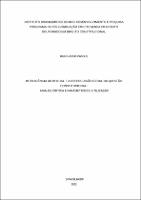Use este identificador para citar ou linkar para este item:
https://repositorio.idp.edu.br//handle/123456789/4673| Título: | Inteligência artificial e a repercussão geral da questão constitucional: análise crítica e parâmetros de utilização |
| Autor(es): | Passos, Hugo Assis |
| Orientador(es): | Mendes, Laura Schertel Ferreira |
| Palavras-chave: | : Sociedade Informacional;Repercussão Geral;Inteligência Artificial;Limites |
| Data de submissão: | 2023 |
| Editor: | Instituto Brasileiro de Ensino, Desenvolvimento e Pesquisa |
| Citação: | PASSOS, Hugo Assis. Inteligência artificial e a repercussão geral da questão constitucional: análise crítica e parâmetros de utilização. 2023. 174 f. Tese (Doutorado em Direito Constitucional) - Instituto Brasileiro de Ensino, Desenvolvimento e Pesquisa, Brasília, 2022. |
| Resumo: | Trata-se de estudo, ora explicativo, ora exploratório, com a finalidade de descrever e explicar
as características dos usos de Inteligência Artificial no Poder Judiciário, partindo-se da análise
do projeto Victor do STF, que será aplicado como mecanismo de apoio na sistemática de
julgamento da Repercussão Geral da Questão Constitucional; nesse mister, investiga-se as
nuances e teorias fundamentais da sociedade informacional; analisa-se a criação do filtro da
Repercussão Geral da Questão Constitucional no ordenamento jurídico brasileiro, através da
Emenda Constitucional nº 45; promove-se reflexões sobre a regulação infraconstitucional deste
e a implementação do meio eletrônico de julgamento; estuda-se a competência, o desenho
procedimental, a pertinência constitucional do plenário virtual e a proposta de uso de
inteligência artificial no STF; verifica-se as matizes dos termos inteligência artificial, machine
learning, deep learning, algoritmos e big data; observa-se a relação entre inteligência artificial
e o Direito e os projetos de implantação de IA no Poder Judiciário brasileiro; aponta-se os
limites constitucionais e infraconstitucionais de uso da IA no julgamento da Repercussão Geral
da Questão Constitucional, verificando-se que existem parâmetros constitucionais do direito à
informação, do dever de fundamentação das decisões, do juiz natural, direito ao processo justo
e da responsabilização pelo ato de julgar. Na seara infraconstitucional, assinala-se os limites no
Código de Processo Civil, na Lei de Acesso à Informação e na Lei Geral de Proteção de Dados.
Conclui-se que as experiências de uso de IA no Poder Judiciário devem observar tais parâmetros
para concretização de direitos e garantias consagrados na Constituição Federal. Realiza-se uma
pesquisa jurídico-dogmática, bibliográfica, cuja análise crítica se vale do raciocínio dedutivo. |
| Abstract: | This is a study, sometimes explanatory, sometimes exploratory, with the purpose of describing and explaining the characteristics of the uses of Artificial Intelligence in the Judiciary, starting from the analysis of the Victor project of the STF, which will be applied as a support mechanism in the judgment of the General Repercussion of the Constitutional Question; in this field, it is investigated how fundamental nuances and theories of the informational society; it analyzes the creation of the filter of the General Repercussion of the Constitutional Question in the Brazilian legal system, through the Constitutional Amendment nº 45; electronic promotion of infra constitutional regulation and the implementation of the means of evaluation thereof; the competence, the procedural design, the constitutional relevance of the virtual plenary and the proposal for the use of artificial intelligence in the STF are studied; the nuances of the terms artificial intelligence, machine learning, deep learning, algorithms and big data are verified; observe the relationship between artificial intelligence and the Law and the AI implementation projects in the Brazilian Judiciary; the constitutional and infraconstitutional limits of the use of AI in the judgment of the General Repercussion of the Constitutional Question are pointed out, verifying that there are constitutional parameters, the right to information, the duty to justify decisions, the natural judge, the right to a fair process and the accountability of the decision for the act of judging. In the infra-constitutional area, the limits in the Civil Procedure Code, the Access to Information Law and the General Data Protection Law are pointed out. It is concluded that the experiences of using AI in the Judiciary must observe such parameters for the realization of rights and guarantees enshrined in the Federal Constitution. A legal-dogmatic, bibliographic research is carried out, whose critical analysis is based on deductive reasoning. |
| URI: | https://repositorio.idp.edu.br//handle/123456789/4673 |
| Aparece nas coleções: | Doutorado Acadêmico em Direito Constitucional |
Arquivos associados a este item:
| Arquivo | Descrição | Tamanho | Formato | |
|---|---|---|---|---|
| Tese_HUGO ASSIS PASSOS _Doutorado_2022.pdf | 983.25 kB | Adobe PDF |  Visualizar/Abrir |
Os itens no repositório estão protegidos por copyright, com todos os direitos reservados, salvo quando é indicado o contrário.
